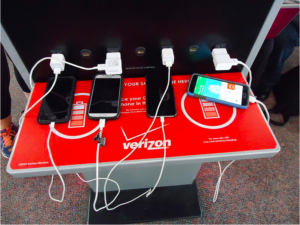
Charging your devices in public has gotten a bit easier with more places offering charging stations. The newer buses in NYC even have USB ports (according to my wife). One place I typically find USB ports in is airports.
I’ve take advantage of USB charging numerous times. It turns out that this could be a dangerous proposition.
NBC Bay Area recently wrote an article that the “FCC Warns Against Being ‘Juice Jacked’ on Free USB Ports.”
Some of you are probably wondering, juice jacked? I immediately thought it sounded a bit like being car jacked.
When using those USB ports to add some juice to your device it can also “put all the data on a device in jeopardy“, according to NBC Bay Area.
According to the article, the way it works is that thieves can install dangerous malware into the USB charging stations. When you plug into the port, your information like passwords, addresses or even a complete backup of the device can be sent to the criminals.
The best way to stop from being juice jacked is to just use a power outlet. Also, power outlets charge quicker than USBs.
Find out more from NBC Bay Area here.
Erica T- Thanks for letting us know!
I am a corporate security consultant. This definitely happens.
iOS is not more secure than Android – that is a myth.
@Erica T.. please site one instance where this has actually been documented to have happened.
All the research I have done points to “it could happen”. I have not yet found one authoritative document, article or paper that references it actually happening.
Hey Patrick, I am not your research assistant. The Wikipedia article on juice jacking has several references. If you don’t believe in the threat, then don’t do anything about it.
Many of these types of security vulnerabilities are caught by government and enterprise organizations. They are definitely not going to disclose this information to the public unless required by law such as when personal information is compromised because it makes them look bad. That’s why there isn’t press about specific breaches.
This isn’t a hack to steal consumer information. This is a hack to steal corporate and government information. USB ports in airports and planes are a great place to do that. No one is regularly scanning them for malware.
I haven’t seen one report of this actually happening. So far it appears to be theoretical. Seems to be really blown all out of proportion to what is actually happening… which is close to nothing.
Erica T- Thanks for that tip!
Lance- Good to know, I stick with Apple.
This is an issue for Android, which is filled with backdoors, not iOS..
Malware often overrides data permission so please don’t count on that. I always use a USB data blocker on public and hotel USB ports. They are cheap and small.
[Not an affiliate link] PortaPow 3rd Gen USB Data Blocker (Red) https://www.amazon.com/dp/B00QRRZ2QM/ref=cm_sw_r_sms_apa_i_pzPdEbN9V892Y
John Nevada- Good to know. Is this the case even if its malware?
If your phone is less than 10 years old, it will ask you if you want to allow whatever you’ve connected it to to suck down your data. Only the most foolish would say yes.